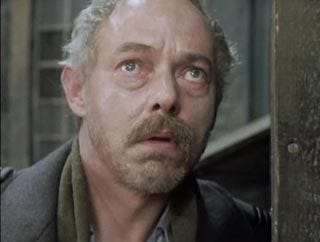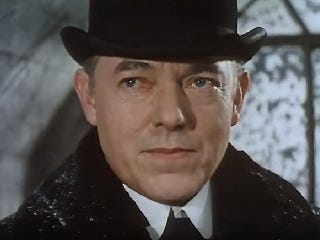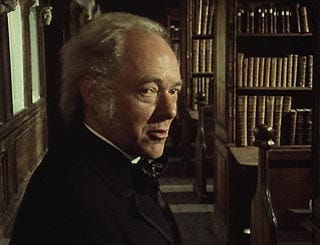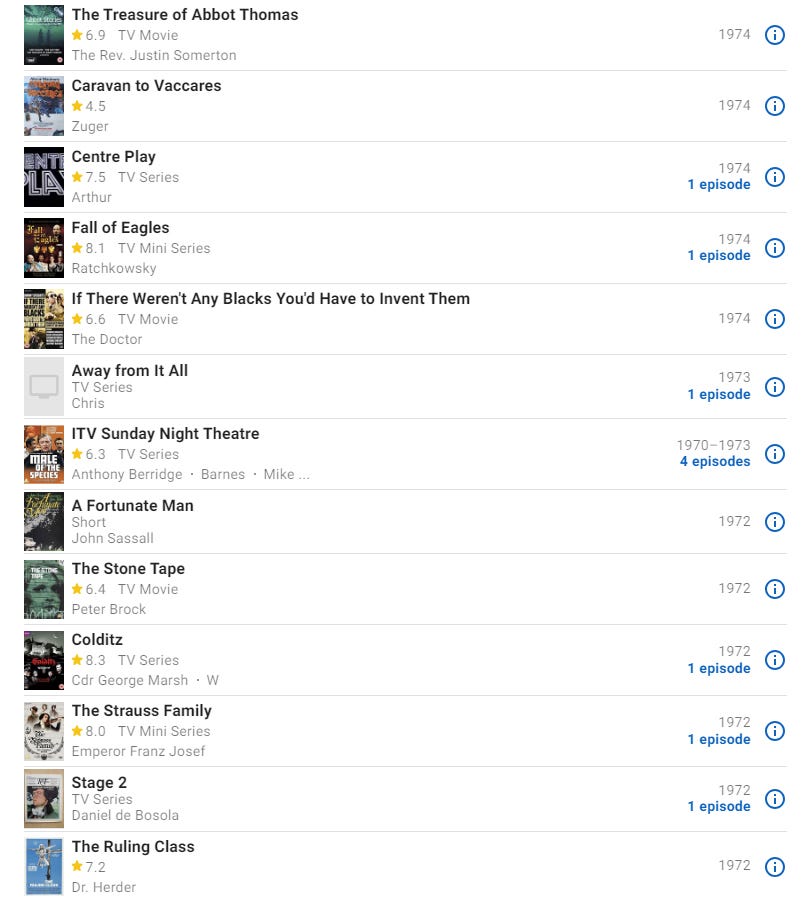I want to write something about an actor who is almost unknown today, yet was the most gifted actor I know of. It seems wrong that people of my generation haven’t heard of him. Hopefully, by writing this short piece, I can help to preserve the memory of his extraordinary talent.
There are two ways in which an actor can qualify as “great”.
The first is gravitas, presence, the ability to command a scene. Examples would be Sean Connery, Michael Caine, Clint Eastwood and Jack Nicholson. In his own way, each had effortless charisma and masculine power, and was able to dominate scenes, easily out-shining the other actors and drawing the viewer in to the story. This is not nothing. It is valuable. In many cases you need an actor like this in the lead role, to “carry” the drama. But it seems like a rather shallow gift, and one not requiring much effort or honing.
The other way to be a great actor is to be good at playing a wide range of different characters. This can be taught (actors in Britain were trained in it up till about 1980) but, as in all areas, the training is limited by the person’s innate talent. So some actors were versatile, but some were very versatile.
As an example to warm us up, let me introduce you to Geraldine Moffat. She acted in two plays, just one year apart. I happened to watch both on the same day. The roles are completely different but Moffat is so skilled that I didn’t realise it was the same actress. She was trained at the Bristol Old Vic Theatre School.
But the most versatile actor I know of is Michael Bryant (1928-2002), trained at the Webber Douglas Stage School. He was so versatile that I saw him in four different roles and never once recognised him. Only years later, doing research one day out of idle curiosity, did I learn it had been the same actor in those four dramas.
1972 Colditz, episode “Tweedledum”
1972 The Stone Tape
1974 Fall of Eagles, episode “The Appointment”
Note that these roles were all within a three-year period. In three years one barely ages at all. Therefore Bryant’s different “aura” in these roles was entirely a product of effort and skill. It was manufactured. He made it happen.
Of course one must acknowledge the contributions made by make-up, hair and costume. These were crucial in “making” Bryant into these various characters. But the rest was him.
British actors used to be good at doing different accents. I don’t know whether Bryant had that skill, but interestingly in the case of these four roles, he uses the same accent (standard RP of his era) every time. It’s just more evidence of his incredible talent that he could seem completely different even while using the same accent. He uses his voice differently - different rhythm, different tenor, and so on.
Colditz sees him as an inmate in a German POW camp in World War II. Here he is a rather meek man, but resourceful and persistent. Gradually, he goes insane. To call this performance memorable would not do it justice. The sheer attention that Bryant puts in to illustrating the character’s slow mental decline is remarkable. He does an incredible job here that, on its own, would mark him out as an exceptional actor. [WATCH]
The Stone Tape sees him as an aggressive “yuppy” sort of man - bold, ambitious, arrogant, bullying, yet also shallow, needy and impetuous, a sort of overgrown toddler. The performance could be described, by today’s standards, as over-the-top, but that is why it is such a thoroughly believable portrait of a narcissist. [WATCH]
Fall of Eagles sees him as a secret service mastermind - calm, icy, watchful, calculating, highly intelligent, and monstrously ruthless. This is a very frightening performance. [WATCH]
The Treasure of Abbot Thomas sees him as an affable vicar, trusting and open but also ambitious and complacent. [WATCH]
Remember, all within a three-year period. But these four roles were far from all he did in that period.
I haven’t seen these other productions. I dare say he “repeated himself” here and there; I will not pretend to assume that he was unrecognisably different in every role he ever played. However, I would expect that within this catalogue there are more than the four “versions” of Bryant that I have seen and described.
When young people nowadays tell me about an actor they think is “great”, the best scenario is that the actor gave a convincing performance that conveyed the character’s emotion to them. This is what now passes as “great”. But usually it’s not even that, and what they mean is that he was “memorable” in some film, perhaps exciting to watch, or he helped them engage with the story. They don’t realise that this used to be the baseline for actors. What they also miss is that, in all likelihood, he is the same in every film - probably just playing himself, or a generic character that any actor with equal gravitas could play.
This is what modern actors are like. They seem to be specifically trained to keep their performances “under-stated” and “naturalistic”. I hate this. As a viewer, you will have to discern the character’s nature and motivations purely from the things he does, because the actor will be doing very little. Not much investment is apparent. He hasn’t studied for the role, thought about it, worked out how to convey this or that, or even what things are there to be conveyed, and whether they should be conveyed, etc. No. He has simply learned the lines and is now “doing his thing”. This is not being a great actor.
To see a great actor, watch Michael Bryant.










Acting... Another beautiful kind of talent lost to modernity.
I would put forward Joaquin Phoenix as the closest thing we have to a great actor these days, though to be perfectly honest I am always utterly aware of the fact that I am watching Joaquin Phoenix and not the character he is playing, despite his excellent work in Gladiator, Joker and Napoleon, among lesser known works like The Master. He does play very different people in each of these films; a cowardly and conniving Roman Emperor, a depressed struggling comedian turned homicidal maniac, a famous 19th Century French Emperor and military commander... All extremely different people. But I'm never lost in his performances. He belongs up there with those you mentioned at the beginning, Jack Nicholson, Michael Caine etc. I don't know of any modern-day Michael Bryant's though.
Excellent article, Colin.
I like that you wrote this tribute to an overlooked and somewhat forgotten actor, whose ability to transform himself in each of those roles ultimately led to his being even less recognised or acknowledged for his innate talent.
One actor that I think is the best this current generation has to offer is Tom Hardy. Because half the time, when questioned, I couldn't tell you what films he's been in. And that's actually a compliment. He inhabits each role he takes on, so completely, that he somehow manages to make himself disappear. I can never remember his name and just before posting this comment, I had to go look it up based on the one single film I could remember him being in: Bronson.
As you yourself noted with regards Michael Bryant, Hardy will have had a lot of help from the make-up, clothing and prosthetics departments that work their magic behind the scenes; but it's more than that. I've probably seen him in about 8 or 9 films (I had to go check his IMDB page to figure that out) and I don't watch a lot of films these days. When I do they're rarely new releases and more likely to be an old vintage flick. And yet I've seen Tom Hardy in a lot of films...whilst not being able to remember him in those roles because he became the character so completely once the cameras started to roll.
It's probably the best compliment I could sincerely give to an actor. The films I've seen him in (and I know he's done a bunch of unserious, brainless films too, but I can't fault the guy for having a strong work ethic and not being a snob about the roles he'll accept) weren't films "Featuring Tom Hardy", they were films where Tom Hardy managed to make himself disappear right before my eyes.
I've no idea what any of his political leanings or religious beliefs are. I know nothing about him other than that quick glimpse at his film credits a few moments ago. I don't want to know anything about him because it's always a bittersweet moment when you find a new artist you really love/enjoy/appreciate, only to discover that they're a crazy leftist nutbag IRL. (I think all of us who sit somewhere on the right have had to learn to separate the artist from the art over the years; If we didn't we'd miss out on a lot of impressive, creative endeavours that had the potential to spark a wee bit of joy in us.)
No, I like the fact that I know almost nothing about the guy, constantly forget his name, and can never remember what films he's been in. Because that is the mark of a truly talented master of his craft. Will he be remembered by the masses, decades down the line? I don't know. But if he isn't, that doesn't mean he wasn't any good. It means he was so good that confounded many people, who also only ever saw the character, not the actor.
Just my tuppence, lol.
Bex